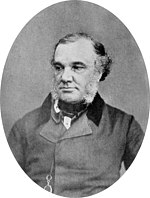Latest revision as of 13:43, 20 February 2024
Information about message (contribute ) This message has no documentation.
If you know where or how this message is used, you can help other translators by adding documentation to this message.
Message definition (Endocrinology ) [[Graves' disease]] was named after Irish doctor [[Robert James Graves]], who described a case of [[goiter]] with [[exophthalmos]] in 1835. The German [[Karl Adolph von Basedow]] also independently reported the same constellation of symptoms in 1840, while earlier reports of the disease were also published by the Italians Giuseppe Flajani and Antonio Giuseppe Testa, in 1802 and 1810 respectively, and by the English physician [[Caleb Hillier Parry]] (a friend of [[Edward Jenner]]) in the late 18th century. [[Thomas Addison]] was first to describe [[Addison's disease]] in 1849.
Graves' disease was named after Irish doctor Robert James Graves , who described a case of goiter with exophthalmos in 1835. The German Karl Adolph von Basedow also independently reported the same constellation of symptoms in 1840, while earlier reports of the disease were also published by the Italians Giuseppe Flajani and Antonio Giuseppe Testa, in 1802 and 1810 respectively, and by the English physician Caleb Hillier Parry (a friend of Edward Jenner ) in the late 18th century. Thomas Addison was first to describe Addison's disease in 1849.
Thomas Addison In 1902 William Bayliss and Ernest Starling performed an experiment in which they observed that acid instilled into the duodenum caused the pancreas to begin secretion, even after they had removed all nervous connections between the two. The same response could be produced by injecting extract of jejunum mucosa into the jugular vein, showing that some factor in the mucosa was responsible. They named this substance "secretin " and coined the term hormone for chemicals that act in this way.
